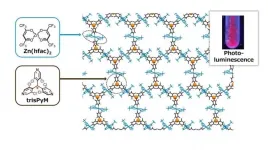More accurate method to predict long term outcomes for pre-invasive breast cancer
A study by Queen Mary University of London researchers confirms the role of the oestrogen receptor biomarker in ductal carcinoma in situ and presents a new and more accurate method to predict long term outcomes for this pre-invasive stage of breast cancer
2021-03-16
(Press-News.org) A study by Queen Mary University of London researchers, funded by Cancer Research UK, confirms the role of the oestrogen receptor biomarker in ductal carcinoma in situ and presents a new and more accurate method to predict long term outcomes for this pre-invasive stage of breast cancer. The study is published in Clinical Cancer Research.
Oestrogen receptor (ER), a protein expressed in some breast cancer cells, is routinely tested in invasive breast cancer to predict long-term outcomes select treatment options. Its role in ductal carcinoma in situ (DCIS) has been previously unclear, and it is not generally evaluated in this pre-invasive stage of breast cancer. The new research confirms the role of ER in predicting long-term outcomes in DCIS, and the authors report a new and more accurate method to evaluate ER for predicting long-term outcomes in DCIS.
This is the first study to use samples from a randomised trial (the UK/ANZ DCIS trial) to investigate ER as a prognostic marker in DCIS. The researchers observed multi-clonality in ER expression in 11% of ER-positive DCIS (ie: ER-positive DCIS with distinct ER-negative clones) and investigated the prognostic role of such multi-clonality in ER expression. They found that ER is a strong prognostic factor with greater than 3-fold risk of ipsilateral recurrence in ER-negative DCIS, and therefore conclude that ER should be routinely assessed in DCIS and that the clonal method they report should be considered.
Lead author Mangesh Thorat from Queen Mary University of London said: "It is unlikely that such a study could currently be reproduced elsewhere in the world, and the robustness of these results means we can rely on them to make changes to clinical practice. Routine testing of ER in DCIS will help to avoid both overtreatment and undertreatment in this type of breast cancer. The insights from this study will also help improve future breast cancer research through use of new scientific models, particularly in areas of drug resistance and the use of targeted therapies."
Michelle Mitchell, chief executive of Cancer Research UK, said: "It's currently very difficult to determine whether DCIS will develop into invasive breast cancer, meaning thousands of people undergo unnecessary and intense treatment. This research shows that in the future we might be able make sure patients are getting the right care, potentially saving many from undergoing cancer treatment that is both physically and mentally demanding."
INFORMATION:
Research paper: Mangesh A Thorat, Pauline M Levey, Louise J Jones, Sarah E Pinder, Nigel J Bundred, Ian S Fentiman, Jack Cuzick. Prognostic value of ER and PgR expression and the impact of multi-clonal expression for recurrence in ductal carcinoma in situ: Results from the UK/ANZ DCIS trial. Clin Cancer Res 2021. DOI 10.1158/1078-0432.CCR-20-4635
Available here after embargo lifts: http://clincancerres.aacrjournals.org/content/early/2021/03/09/1078-0432.CCR-20-4635
ELSE PRESS RELEASES FROM THIS DATE:
2021-03-16
A new study in Nicotine & Tobacco Research, published by Oxford University Press, finds that the use of high-strength nicotine e-cigarettes can help adults with schizophrenia spectrum disorders quit smoking.
Some 60-90% of people with schizophrenia smoke cigarettes, compared to 15-24% of the general population. The researchers from the University of Catania, in collaboration with colleagues from City University of New York and Weill Medical College of Cornell University, have assessed here the feasibility of using a high-strength nicotine e-cigarette to modify smoking behavior in people with schizophrenia spectrum disorders who smoke cigarettes. In this study ...
2021-03-16
Finding the best materials for tomorrow's electronics is the goal of Professor Emanuele Orgiu of the Institut national de la recherche scientifique (INRS). Among the materials in which Professor Orgiu is interested, some are made of molecules that can conduct electricity. He has demonstrated the role played by molecular vibrations on electron conductivity on crystals of such materials. This finding is important for applications of these molecular materials in electronics, energy and information storage. The study, conducted in collaboration with a team from the INRS and the ...
2021-03-16
Researchers at the University of Surrey have found that non-invasive skin swab samples may be enough to detect COVID-19.
The most widely used approach to testing for COVID-19 requires a polymerase chain reaction (PCR) test, which involves taking a swab of the back of the throat and far inside the nose.
In a paper published by Lancet E Clinical Medicine, chemists from Surrey teamed up with Frimley NHS Trust and the Universities of Manchester and Leicester to collect sebum samples from 67 hospitalised patients - 30 who had tested positive for COVID-19 and 37 who had tested negative. The samples were collected by gently swabbing a skin area rich in sebum - an oily, waxy substance produced by the body's sebaceous glands - such as the face, neck or back.
The researchers analysed ...
2021-03-16
Children who are exposed to abuse before they are eleven years old, and those exposed to abuse both in childhood and adolescence may be more likely to develop conduct problems (such as bullying or stealing) than those exposed to abuse in adolescence only and those who are not exposed to abuse, according to a study published in the open access journal BMC Psychiatry.
A team of researchers at the Universities of Bath and Bristol examined data on 13,793 children and adolescents (51.6% boys), who were followed from ages four to 17 years, included in the Avon Longitudinal Study of Parents and Children, ...
2021-03-16
Rapid deployment of artificial intelligence and machine learning to tackle coronavirus must still go through ethical checks and balances, or we risk harming already disadvantaged communities in the rush to defeat the disease.
This is according to researchers at the University of Cambridge's Leverhulme Centre for the Future of Intelligence (CFI) in two articles, published today in the British Medical Journal, cautioning against blinkered use of AI for data-gathering and medical decision-making as we fight to regain some normalcy in 2021.
"Relaxing ...
2021-03-16
Coordination polymers (CPs) composed of organic radicals have been the focus of much research attention in recent years due to their potential application to a wide variety of next-generation electronics, from more flexible devices to 'spintronics' storage of information. Sadly, they often suffer from their limited stability and poor crystallinity. Researchers from Japan's Institute for Molecular Science (IMS), National Institute of Natural Sciences (NINS) have developed a novel recipe that not only produces a stable material, but offers a variety of other useful attributes.
Their findings appear in the journal ...
2021-03-16
The 2020 COVID-19 pandemic is creating a viral archive, an archaeological record of history in the making. One aspect of this archive is increased environmental pollution, not least through discarded face-masks and gloves, collectively known as PPE, that characterise the pandemic.
These items of plastic waste have become symbolic of the pandemic and have now entered the archaeological record, in particular face-masks.
In the UK alone, 748 million items of PPE, amounting to 14 million items a day, were delivered to hospitals in the two or so months from ...
2021-03-16
Researchers believe they may have discovered a possible cause of a mystery condition that can leave sufferers suddenly unable to walk, talk or see.
It's hoped the study - led by the University of York and Hull York Medical School and supported by Tees, Esk and Wear Valley NHS Trust - will pave the way for new treatments for Conversion disorder which affects around 800,000 people in the UK alone.
The condition, also known as functional neurological disorder (FND), causes physical symptoms that would appear neurological but doctors can't find an injury or physical condition to explain them.
Professor Christina van der Feltz-Cornelis from the Department of Health Sciences is leading the Conversion And Neuro-inflammation ...
2021-03-16
Two-thirds of 1,120 healthcare workers surveyed worldwide would separate mothers and babies with a positive or unknown COVID-19 status.
Implementing Kangaroo Mother Care and keeping mothers and babies together could save more than 125,000 newborn lives, representing 65x decreased risk of newborn death compared to the risk of newborn deaths from COVID-19.
New research underscores the need for decision-makers and providers, particularly in LMICs, to protect and strengthen care for small and sick newborns during the pandemic.
The COVID-19 pandemic is affecting the quality of care given to small and sick newborn babies in all regions of the world and threatening implementation of life-saving interventions, ...
2021-03-15
Below please find summaries of new articles that will be published in the next issue of Annals of Internal Medicine. The summaries are not intended to substitute for the full articles as a source of information. This information is under strict embargo and by taking it into possession, media representatives are committing to the terms of the embargo not only on their own behalf, but also on behalf of the organization they represent.
1. Switching from TDF- to TAF-containing ART associated with the development of obesity in people living with HIV
Abstract: https://www.acpjournals.org/doi/10.7326/M20-4853
URL goes live when the embargo lifts
Switching from antiretroviral therapy ...
LAST 30 PRESS RELEASES:
[Press-News.org] More accurate method to predict long term outcomes for pre-invasive breast cancer
A study by Queen Mary University of London researchers confirms the role of the oestrogen receptor biomarker in ductal carcinoma in situ and presents a new and more accurate method to predict long term outcomes for this pre-invasive stage of breast cancer


